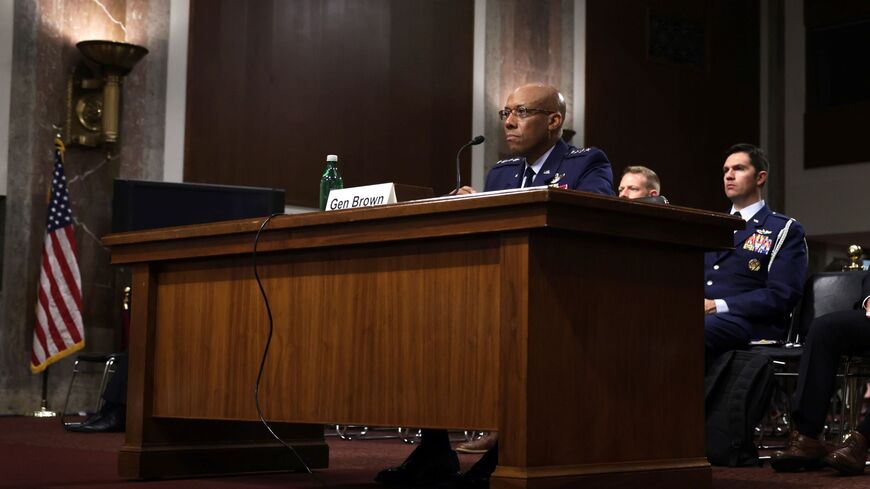President Joe Biden’s nominee to become the Pentagon’s next top general, Air Force Gen. CQ Brown, signaled his intent to further Washington’s current approach of building up military cooperation between Middle Eastern countries in order to deter attacks by Iran against its neighbors.
“It’s something we'll have to continue to help support,” Brown said in response to a question by Sen. Jacky Rosen (D-Nev.) during his confirmation hearing to become the next Chairman of the Joint Chiefs of Staff on Tuesday.
“Part of this is ensuring that as we do this, we’re also providing them the capabilities to be able to support efforts to push back against Iranian aggression in all forms,” Brown told members of the Senate's Armed Services Committee. “The threat has gotten more complicated, and so we cannot rest on our laurels.”
The context: Brown’s answer came to a question by Sen. Rosen as to how he — if confirmed by the Senate — would confront Iran's attacks and leverage the Abraham Accords to support regional defense cooperation.
Rosen cited the Iranian navy’s attempt to seize two fuel tankers in the Gulf of Oman last week, a move she dubbed “a troubling escalation,” even as other lawmakers from both parties have urged the Biden administration to seize sanctioned Iranian oil and gas shipments.
US administrations have sought for more than two decades to build up the defensive capabilities of Iran’s neighbors, but disputes and lingering distrust between Arab states as well as limitations on US arms sales abroad have inhibited progress, officials have said.
US Central Command has made notable gains over the past two years, bringing Israeli forces into exercises with Arab militaries for the first time and encouraging regional air force chiefs to share radar data in nascent steps towards an integrated air and missile defense architecture.
And yet: “I think we've got to stay involved with our allies and partners,” Brown said later during the hearing in an exchange with Sen. Rick Scott (R-Fla.).
The former Air Force chief of staff further suggested to lawmakers that the US goal of deterring Iran shouldn’t fall to the Pentagon alone.
“The thing I do think about is the role all parts of government play in our overall deterrence,” Brown told the Senate panel. “It's not just what the military does, it's what we do in the diplomatic space, what we do in the information space, what we do economically, I think all those things to work collectively together,” he said.
“If confirmed as the Chairman of the Joint Chiefs, I think I have a responsibility not only to provide … the military advice, but I need to put it in the context and understanding the other factors that are in play as well.”
Why it matters: Brown’s response signifies he is squarely in line with the Biden administration’s balance between diplomatic outreach to Tehran while building Arab military capabilities.
Pentagon officials under the Biden administration have broken from the Trump administration's approach of relying upon large military footprints in the Middle East to deter Iranian attacks, instead relying on expanding autonomous surveillance, declassifying intelligence and practicing rapid deployments of key forces to respond to potential military escalations.
The latter is an approach Brown advocated in his previous role as Air Force chief of staff as the Pentagon seeks to deter Russia and China. Meanwhile, Biden administration officials have sought to convince Arab leaders that US drawdowns in the Middle East do not mean Washington is abandoning its security commitments in the region.
“The coalescing of all the nations now to talk about this provides us an opportunity to work more closely together in our collective efforts to deter the activities by Iran, whether it's in the Strait of Hormuz in the Gulf or any other place in the Middle East,” Brown told the Senate panel on Tuesday.
Know more: The Biden administration is doubling down on the "by, with and through" approach to respond to crises in the Middle East.
Last month, three Arab militaries scrambled fighters to shoot down mock incoming drones in a combined air defense exercise held in Saudi Arabia following top US diplomat Antony Blinken's attendance at the GCC ministerial summit in Riyadh.
This week, the US and Israel kicked off the second iteration of Juniper Oak. The new series of US CENTCOM war games enabled the Israeli Air Force to participate in long-range strikes similar to what Israeli officials have long argued would be necessary to stop Iran from producing a nuclear weapon.
What’s next: Despite broad support for Brown's nomination, Sen. Tommy Tuberville (R-Ala.) has shown no signs of backing down on the hold he has placed on Senate confirmations. More than 260 other flag and general military officers' nominations remain in limbo over the hold.
“We will lose talent because of those challenges,” Brown told Senate lawmakers on Tuesday.








